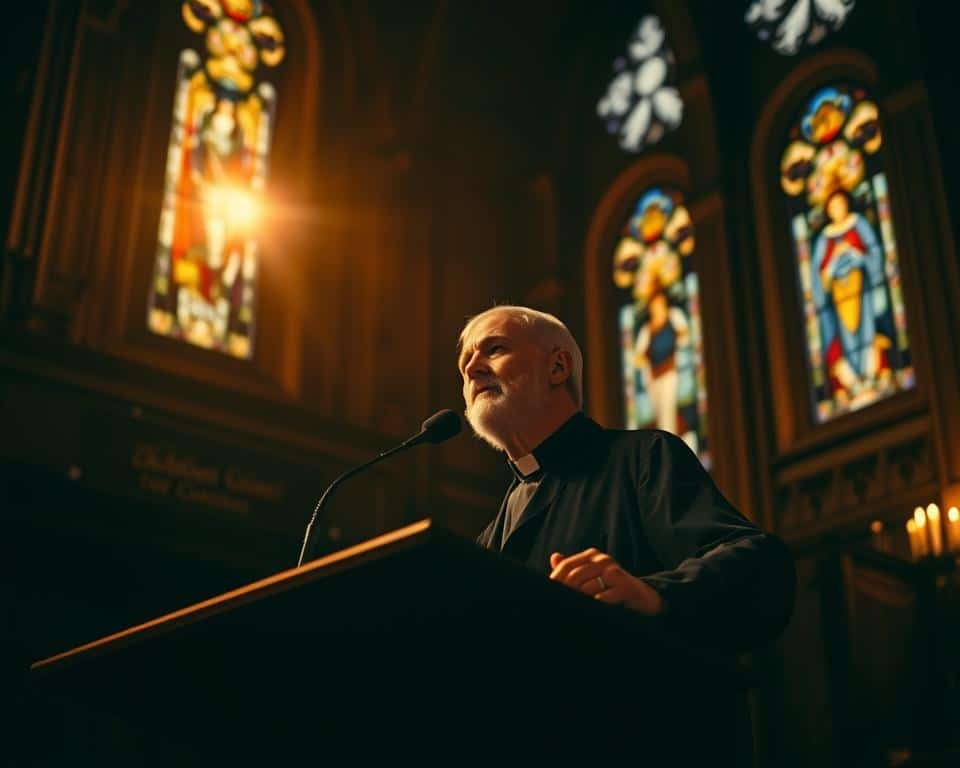“Worship is the submission of all our nature to God.” — C.S. Lewis. These words capture the heart of what happens when believers gather. Every service reflects careful guidance, blending truth and community under God’s word. In service in Christian worship, believers unite in a shared expression of devotion, fostering an environment of love and support. This communal aspect not only strengthens individual faith but also cultivates a deeper connection with God and one another. Through prayer, song, and scripture, the congregation embarks on a journey of transformation that echoes beyond the sanctuary.
Church leaders craft moments that draw people closer to Christ. They balance Scripture, prayer, and music to create meaningful encounters. The Bible, like John 4:24, reminds us worship must be rooted in truth and spirit. Through sermons and communal activities, church leaders emphasize the importance of fostering a genuine connection with God and one another. By integrating scripture’s influence on worship practices, congregations are encouraged to reflect on profound truths that strengthen their faith. Ultimately, these thoughtful approaches to worship not only enrich individual spiritual journeys but also cultivate a vibrant community grounded in shared beliefs.
From sermons to songs, every element points to the gospel. It’s not just about music—it’s about faith in action. Pastors ensure services honor God while inviting everyone to participate.
When done well, worship unites the church. It strengthens believers and welcomes seekers. This sacred time transforms hearts through God’s truth.
The Role of Pastors in Worship
A worship pastor’s calling isn’t just musical; it’s deeply rooted in biblical discipleship. While songs uplift the congregation, true leadership centers on God’s Word and people. This dual focus separates spiritual shepherds from performers.

Biblical Foundations Over Performance
Many assume worship pastors only curate playlists. Yet 2 Timothy outlines higher priorities:
- Gospel-centered teaching—every lyric and sermon must align with truth.
- Discipleship—equipping believers to live out faith daily.
- Resisting trends—cultural relevance never outweighs Scripture.
“The key term in ‘worship pastor’ is pastor. Music is a tool, not the mission.”
Shepherding Beyond Sundays
A leader’s heart shines brightest offstage. Hospital visits, prayer meetings, and one-on-one discipleship reveal true ministry. Like Jesus in John 10, they know their flock by name.
Worship pastors often face tension: rehearsals demand time, but souls need care. The balance? Let prayer and God’s Word guide both.
Biblical Duties of Pastors
Faithful teaching shapes worship that honors Scripture. Leaders are called to uphold truth while nurturing their flock. Their work extends far beyond the pulpit—it’s a sacred trust grounded in God’s Word.
Preaching and Teaching God’s Word
Paul’s charge in 2 Timothy 4:2 is clear: “Preach the word; be ready in season and out of season.” Every sermon should anchor the congregation in gospel truth. For example, a study of Ephesians 4:11-12 reveals how teaching equips believers for daily ministry.

Doctrinal integrity matters. Titus 1:9 warns against shallow teaching. When leaders prioritize Scripture, worship becomes a response to truth, not just emotion.
Shepherding the Congregation
Jesus modeled care in John 10:14—He knows His sheep by name. Pastors follow this example through:
- Protection: Guarding against false teaching (Acts 20:28-29).
- Guidance: Leading with humility, as 1 Peter 5:2-3 instructs.
“A shepherd’s heart beats for the lost and the weary.”
Providing Spiritual Guidance
James 5:14 highlights prayer and counsel during crises. Leaders offer three key supports:
- Conflict resolution rooted in Matthew 18:15-17.
- Grief care that points to hope (1 Thessalonians 4:13-14).
- Discipleship for lifelong faith growth.
True worship flows from hearts shaped by God’s Word. As one pastor noted, “Teach truth, and the songs will follow.”
Leading Worship with Truth and Hope
Biblical worship isn’t just about songs—it’s about anchoring people in hope. When services center on Scripture, they become lifelines for weary hearts. 2 Timothy 1:8-14 reminds us: the gospel is the foundation worth building upon.
Every hymn and sermon should reflect God’s character. For example, pairing Psalm 23 with modern songs about God’s faithfulness creates continuity. This approach helps congregations see Scripture’s relevance today.
Leaders have a sacred task—curating lyrics that teach sound doctrine. One church saw revival after replacing vague lyrics with hymns rooted in Romans 8. As their pastor noted, “When truth sings, hearts change.”
Epistles like Philippians offer hope-filled themes for tough seasons. A Midwest congregation facing job losses found strength through services built on Philippians 4:6-7. Their worship became prayers set to music.
“Worship planning is discipleship—every song is a chance to rehearse truth.”
You’ll notice lasting transformation when worship points to Christ’s victory. From urban churches to rural chapels, the pattern holds: truth nourishes, hope sustains, and lives are rebuilt.
The Worship Pastor’s Weekly Routine
Behind every powerful worship service lies a carefully planned week of preparation. What happens between Sundays shapes the moments that draw people closer to God. From music charts to pastoral care, leaders invest 46–54 hours weekly to shepherd their teams and congregations.
Preparation and Rehearsal
Monday often starts with chart writing—6–10 hours spent selecting songs, editing keys, and emailing rehearsal notes. By Thursday, the worship leader gathers the team to refine Sunday’s flow. Every chord and lyric aligns with Scripture, ensuring truth anchors the service.
Equipment checks matter too. Testing mics, updating software, and troubleshooting livestreams ensure seamless worship. As one leader shared, “Excellence honors God and removes distractions.”
Administrative and Pastoral Tasks
Beyond music, leaders juggle:
- Staff meetings: Aligning sermons, events, and outreach.
- Counseling: Walking with members through life’s storms.
- PlanningCenter.com: Scheduling volunteers and tracking setlists.
Friday wraps with budget reviews and finalizing next week’s vision. Yet the heart of the work remains shepherding—whether answering late-night calls or praying over a struggling team member.
“A worship leader’s calendar reflects their priorities: God’s Word first, people second, music third.”
How Pastors Influence Congregational Worship
Every Sunday service reflects the heart of a pastor’s leadership. Like Paul urged Timothy, they multiply their impact by training others (2 Timothy 2:2). Worship teams grow when leaders invest in discipleship—not just rehearsals.
Your congregation mirrors what you model. When pastors engage authentically—hands raised, eyes closed—others follow. “People worship how they see their leaders worship,” notes a Midwest church planter. It’s not performance; it’s shared surrender.
Sermon themes and songs should intertwine. If preaching on grace, choose hymns like “Amazing Grace” or modern anthems about redemption. This synergy roots truth in melody, helping the congregation retain Scripture.
Balance is key. New music attracts younger generations, but depth matters. A Nashville worship leader shares: “We test every lyric against Philippians 4:8—is it true, noble, and praiseworthy?” Metrics like prayer requests and small-group discussions reveal engagement beyond attendance numbers.
“Train your team to lead, not just perform. Then watch worship multiply.”
At its core, worship leadership is shepherding. When pastors prioritize God’s Word and people, the congregation responds with wholehearted praise. That’s discipleship in action.
The Importance of Prayer in Pastoral Work
Prayer fuels every aspect of a pastor’s work, from personal faith to leading the church. Like Paul urged Timothy to pray constantly (2 Timothy 1:3-4), today’s leaders find strength in daily communion with God. It’s not just a discipline—it’s their lifeline.
- Intercessory: Lifting others’ needs (Colossians 1:9-14).
- Liturgical: Guiding congregational prayers during services.
- Personal: Private moments of surrender and renewal.
- Crisis: Urgent petitions for healing or wisdom.
- Corporate: Uniting the church in shared supplication.
A structured prayer journal keeps focus. Many pastors use the ACTS model:
- Adoration: Praising God’s character.
- Confession: Aligning with truth (1 John 1:9).
- Thanksgiving: Celebrating answered prayers.
- Supplication: Presenting specific requests.
“When I neglect prayer, my sermons lack power. When I pray, God moves.” — A Midwest Pastor
Prayer also guards against burnout. Long hours and emotional burdens drain leaders. But time with God restores joy and clarity. One study found pastors who pray 30+ minutes daily report higher resilience.
Worship planning thrives on prayer too. Charles Spurgeon’s “prayer room” birthed revival. Today, teams praying over setlists often see deeper engagement. A Nashville church saw attendance double after committing to pre-service prayer.
Your church’s vitality starts on your knees. As you pray, watch God transform hearts—including yours.
Pastors as Discipleship Leaders
True leadership multiplies when believers grow in faith together. 2 Timothy 1:6 urges leaders to “fan into flame” God’s gifts in others. This four-step process works for worship teams:
- Identify potential—notice who engages deeply with lyrics or serves eagerly.
- Pair with mentors—seasoned musicians teach skills while modeling prayer.
- Train in small groups—12-15 members study Scripture and rehearse weekly.
- Release to lead—new leaders direct subsets like youth or prayer bands.
Your mentorship pipeline matters. Start with congregants who show passion. Class leaders then coach them monthly, blending musical training with Bible study. One church saw 80% of their worship team rise through this system.
Balance is key. A Nashville leader shares: “We assess both chord charts and quiet times.” Use this checklist to evaluate growth:
- Can they explain the gospel through their instrument?
- Do they pray with team members before practicing?
- Are they serving beyond the stage?
“Discipleship isn’t a program—it’s helping people live out God’s word daily.”
When leaders invest in people, the gospel spreads deeper. That’s how churches grow—not just in numbers, but in faith.
Practical Responsibilities Beyond Sundays
Sundays may highlight a pastor’s work, but the real impact happens throughout the week. Behind the scenes, leaders serve in ways that strengthen both individuals and the whole church.
- Visitation: Hospital calls, home visits, and checking on shut-ins build trust.
- Conflict resolution: Mediating disputes with grace, as Matthew 18:15-17 teaches.
- Budget oversight: Ensuring funds align with the church’s mission.
- Counseling: Many pastors share this work with trained lay leaders.
- Community outreach: Food drives, school partnerships, and mentoring programs.
- Equipment maintenance: Fixing sound systems or updating livestream setups.
- Continuing education: Conferences and courses to stay grounded in truth.
Counseling loads often surprise new leaders. One study found pastors spend 15+ hours weekly listening and guiding. Smart churches distribute this work across staff and volunteer teams.
“Delegate tasks that others can do, so you’re free for what only you can do—shepherding.”
Community outreach anchors the church in local needs. For example, an Ohio congregation tutors kids and hosts job fairs. Their pastor says, “Meeting practical needs opens doors for gospel conversations.”
Time management tools help balance these roles. Many leaders use:
- Digital calendars with color-coded priorities
- Weekly planning sessions with staff
- Automated giving platforms (like Vanco) to streamline finances
Your church grows when leaders focus on people, not just programs. As one pastor noted, “The work never ends, but neither do God’s mercies.”
Challenges Faced by Worship Pastors
Leading worship comes with deep joys but also unique struggles. While Sundays showcase celebration, the week often involves spiritual battles few see. 1 Peter 5:8 reminds us the enemy targets shepherds first.
- Unrealistic expectations: Balancing congregational preferences with biblical truth
- Creative fatigue: Constantly sourcing fresh yet doctrinally sound material
- Criticism: Navigating diverse opinions on music styles and volume
- Boundary struggles: When “always available” becomes unsustainable
- Spiritual warfare: Attacks on families, health, and motivation
Recent studies show 40% of pastors consider leaving ministry yearly. The work demands emotional energy that often goes unreplenished. Many report feeling torn between artistic expression and liturgical requirements.
“My greatest challenge? Remembering I’m called to serve God, not please everyone.”
Healthy boundaries start with saying “no” to protect your heart. Schedule uninterrupted family time and personal worship. Delegate tasks like sound checks or social media to trusted team members.
For spiritual renewal, many leaders find strength in:
- Morning prayer before checking emails
- Monthly retreats for reflection
- Accountability partnerships with other pastors
When criticism comes—and it will—Colossians 3:23 offers perspective: “Work heartily, as for the Lord.” Your ultimate audience sits on heaven’s throne. That truth sustains through every challenge.
Supporting Pastors in Their Ministry
Healthy churches thrive when members actively support their leaders. 1 Thessalonians 5:12-13 urges us to esteem those who labor among us. Your care makes a tangible difference in their ability to serve.
- Form a prayer group specifically for leadership needs
- Provide gift cards for family outings or date nights
- Respect vacation time—cover pulpit duties without guilt trips
- Send handwritten notes of encouragement year-round
- Offer practical help like lawn care or home repairs
- Advocate for fair compensation and benefits
- Host spouse appreciation events discreetly
- Share positive feedback after sermons
- Volunteer for administrative tasks
- Defend them from unfair criticism
Biblical care committees stem from 1 Timothy 5:17-18. These teams ensure leaders “not be muzzled” while serving. They might coordinate meals during busy seasons or arrange retreat scholarships.
Effective appreciation goes beyond Pastor Appreciation Month. Try these ideas:
- Surprise coffee deliveries before meetings
- Annual stipends for continuing education
- Public recognition of specific contributions
Constructive feedback follows Ephesians 4:29 principles. Instead of “I dislike the music,” try “Could we explore more hymns?” Always pair concerns with potential solutions.
“When our church started monthly prayer lunches for staff, their sermons gained new depth.” — Ohio Elder
Pastors’ spouses often feel isolated. Your church can help by:
- Respecting their privacy in social settings
- Including them without expectation of service
- Offering childcare for their personal time
Remember, supporting leaders isn’t charity—it’s kingdom investment. As you strengthen them, the whole body grows healthier.
The Lasting Impact of Faithful Pastoral Leadership
Faithful leadership plants seeds that grow for generations. 2 Timothy 2:2 shows how truth passes from mentors to disciples, creating a ripple effect. Churches thrive when leaders prioritize God’s Word over trends.
Consider a small-town church transformed by 30 years of doctrinal faithfulness. Their youth now lead ministries, proof that consistency bears fruit. Colossians 3:23-24 reminds us: work for the Lord, not human approval.
Your legacy isn’t measured in crowds but in changed lives. A pastor’s influence outlasts their tenure—through prayers answered, marriages restored, and faith deepened. That’s eternal impact.
Keep sowing truth. One day, you’ll see the harvest.
FAQ
What is the main responsibility of a worship pastor?
A worship pastor leads the congregation in praising God through music and Scripture. They help create an atmosphere where people can connect with God’s truth.
How does a pastor balance preaching and worship?
By ensuring both music and sermons point to Jesus. Worship songs reinforce the message, and preaching grounds the service in God’s word.
Why is prayer important in a pastor’s work?
Prayer keeps the leader’s heart aligned with God. It also invites the Holy Spirit to guide worship and teaching.
What challenges do worship pastors face?
Managing time between rehearsals, sermons, and pastoral care can be tough. Staying focused on God’s glory, not performance, is key.
How can church members support their pastor?
Pray for them, encourage them, and serve alongside them. A strong team helps the ministry thrive.
What makes worship meaningful in a service?
When hearts engage with truth, not just songs. Pastors help by selecting music that reflects Scripture and leads people to Christ.
Do pastors only work on Sundays?
No, they prepare sermons, visit members, and disciple others throughout the week. Leading worship is just one part of their calling.





